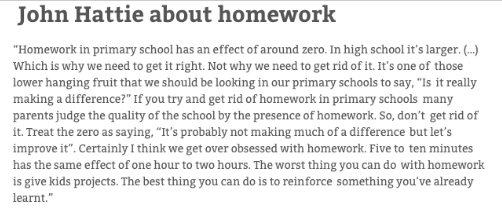
The Thing About Homework
contributed by Drew Perkins
As schools around the United States get restarted for another year so does the annual debate about homework. Should there be mandatory homework? How much is appropriate? Does it further disadvantage disadvantaged students? Does it have any effect? Shouldn’t the kids just be able to play and enjoy their time off of “work”? Is it overly stressful?
While all of these are meaningful questions it seems to me we’re chasing the solution to a problem inside of an antiquated system instead of reframing the problem as the system itself. Here’s the thing about homework…there is no right answer.

John Hattie is on record for his research showing homework has no effect in primary grades. So don’t give homework, right? Well…no. He qualifies that in this interview by saying we should improve it.
While I don’t agree with his apparent reasoning that we might change, not eliminate, homework because it’s a marker of quality by parents, I do think we should look at it differently.
Many athletic coaches will tell you the best teams are player-led teams and as a former basketball coach I agree. Ideally, we’re trying to create, among other things, self-directed learners. As a coach, I worked to help my players be clear about what they were trying to achieve and to embrace how to get there.
For example, I mandated a certain number of sprints per practice but asked players to think about what they needed to be prepared for their upcoming games. Many ran extra sprints knowing that they were doing so, not to please their coach, but to be better prepared to play hard throughout the game without becoming exhausted.
Shifting the dialogue around the work done in (and out of) school similarly would be helpful. In a project-based learning environment, we should ideally see students taking control of their own learning in ways that could see them self-assigning homework just as responsible adults do. If they understand what they need to know and be able to do because they’ve identified those things with a teacher-facilitator’s help, they can set timelines and formative checks for themselves and their groups along the way.
Does this mean that teachers can never assign homework? No, but it would mean that assigned homework would be less frequent and hopefully more personalized to the needs of the student and their ongoing work and growth.
When I taught AP Psychology I never assigned homework but that doesn’t mean students didn’t do it. Being on a tight timetable with an AP test date that came regardless of snow days or other distractions meant I had to be pretty structured. So I created a calendar with hard dates for each module (chapter) and each student was responsible for creating and presenting one of their choice. They also had quizzes for each module which led up to unit tests.
All of this meant that they could choose when to prepare themselves by essentially assigning themselves homework and it worked effectively enough that our AP test scores were consistently higher than the national average. Students were given the autonomy to make meaning and prepare themselves in any way they saw fit instead of me mandating prescribed work that may or may not have been helpful.
In my podcast above with Alfie Kohn (Ep. 42 Should We Assign Homework And Grades?) he echoes the lack of research that supports homework’s effectiveness. He also makes the point that “homework may be the most powerful way to extinguish children’s curiosity in learning.” While you may think he’s an extremist, at the very least it’s important that we (re)consider what we’re trying to accomplish with any homework and what it is actually accomplishing.
Does your homework create significant friction between students and parents and learning? Are there better ways to accomplish some of the goals, like parent-child interaction or teaching responsibility that you’re after? Does the homework help students grow and check their own growth or is it more about getting it done for a grade?
In the end, the thing about homework is that there is no right answer. Just as the world is ever-changing and evolving so should an authentic classroom. Rigid policies of homework that are teacher-directed are much less likely to positively impact students than students pursuing their own questions in a rigorous manner where they may or may not need additional time and work outside of class.
The Thing About Homework
